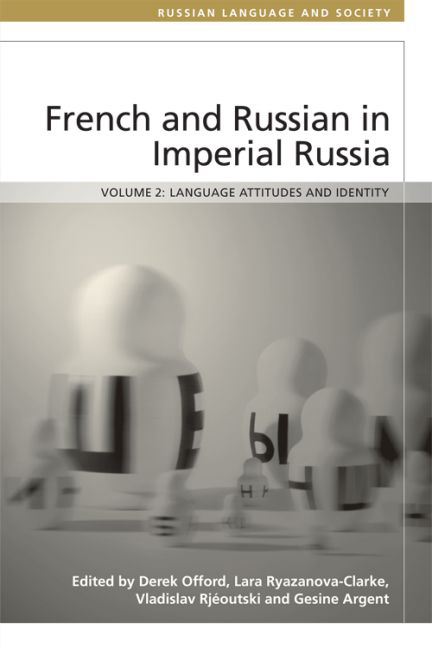Book contents
- Frontmatter
- Contents
- Preface
- Note on Dates, Transliteration and Other Editorial Practices
- Abbreviations Used in the Text, Notes and References
- Dates of Reigns in Eighteenth- and Nineteenth-Century Russia
- Dedication
- Introduction
- 1 The Pan-European Justification of a Multilingual Russian Society in the Late Eighteenth Century
- 2 Princess Dashkova and the Politics of Language in Eighteenth-Century Russia
- 3 Plating ‘Russian Gold’ with ‘French Copper’: Aleksandr Sumarokov and Eighteenth-Century Franco-Russian Translation
- 4 Francophone Culture in Russia Seen through the Russian and French Periodical Press
- 5 Linguistic Gallophobia in Russian Comedy
- 6 The Linguistic Debate between Karamzin and Shishkov: Evaluating Russian–French Language Contact
- 7 Language and Conservative Politics in Alexandrine Russia
- 8 Seduction, Subterfuge, Subversion: Ivan Krylov's Rewriting of Molière
- 9 The French Language of Fashion in Early Nineteenth-Century Russia
- 10 Russian ‘Translations’ of Patrie in the Napoleonic Period
- 11 Treatment of Francophonie in Pushkin's Prose Fiction
- 12 Love à la mode: Russian Words and French Sources
- Conclusion
- Notes on contributors
- Index
2 - Princess Dashkova and the Politics of Language in Eighteenth-Century Russia
Published online by Cambridge University Press: 25 October 2017
- Frontmatter
- Contents
- Preface
- Note on Dates, Transliteration and Other Editorial Practices
- Abbreviations Used in the Text, Notes and References
- Dates of Reigns in Eighteenth- and Nineteenth-Century Russia
- Dedication
- Introduction
- 1 The Pan-European Justification of a Multilingual Russian Society in the Late Eighteenth Century
- 2 Princess Dashkova and the Politics of Language in Eighteenth-Century Russia
- 3 Plating ‘Russian Gold’ with ‘French Copper’: Aleksandr Sumarokov and Eighteenth-Century Franco-Russian Translation
- 4 Francophone Culture in Russia Seen through the Russian and French Periodical Press
- 5 Linguistic Gallophobia in Russian Comedy
- 6 The Linguistic Debate between Karamzin and Shishkov: Evaluating Russian–French Language Contact
- 7 Language and Conservative Politics in Alexandrine Russia
- 8 Seduction, Subterfuge, Subversion: Ivan Krylov's Rewriting of Molière
- 9 The French Language of Fashion in Early Nineteenth-Century Russia
- 10 Russian ‘Translations’ of Patrie in the Napoleonic Period
- 11 Treatment of Francophonie in Pushkin's Prose Fiction
- 12 Love à la mode: Russian Words and French Sources
- Conclusion
- Notes on contributors
- Index
Summary
In a letter composed in 1807, during her extended stay with Princess Ekaterina Dashkova on her estate at Troitskoe, Catherine Wilmot informed a friend in Ireland, ‘Most good-naturedly the Princess has enter'd into our wish of rummaging for Russia in this country, and as the merchants and peasants still preserve their practices, she order'd a Russian entertainment’ (RIA, MS 12.L.30, p. 159; Wilmot 1935: 248). Like her sister, Martha, Catherine remarked on the pervasiveness of foreign influence that she observed in Russia, criticising the tendency of the Russians she encountered – especially women – to imitate French customs and manners. Catherine poked fun at her own inability to learn Russian, declaring that ‘My powers of idleness […] increase daily!’, while noting that Martha had learned to speak and to read ‘wonderfully […] The Princess teaches her & they correspond in notes, every day almost’ (RIA, MS 12.L.30, pp. 47–8; Wilmot 1935: 203). Ironically, although her letters were composed in English, Catherine wrote much of her own journal – as well as her extensive notes on religion and folklore among the Russian peasantry – in French, and confessed to reading French novels pour me distraire un peu… (to amuse myself a little) (RIA, MS 12.L.31, p. 35).
The letters and journals of the Wilmot sisters touched repeatedly on the significance of multilingualism and cultural borrowing in Russian society. Far from being an anomaly, their commentary was well in keeping with the growing conviction of their contemporaries that language occupied a central place in the construction of individual and national identity. Both sisters devoted much of their stay with Princess Dashkova to seeking the ‘authentic’ in Russian culture – a pursuit that reflected the aspirations of their hostess (Byrne 2009). As we shall see, the Wilmot sisters’ observations about Russian society thus bring to the fore three preoccupations in the life of Dashkova in particular and in European society more generally at the turn of the nineteenth century: the role of multilingualism in shaping (or undermining) linguistic and cultural identity; the dangers inherent in cultural borrowing, particularly in the Russian case; and the interplay between gender and language reform.
- Type
- Chapter
- Information
- French and Russian in Imperial RussiaLanguage Attitudes and Identity, pp. 31 - 47Publisher: Edinburgh University PressPrint publication year: 2015

